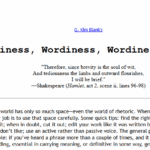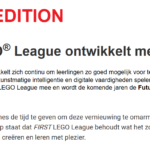About this post This post is aimed in particular at educators in the US that are skeptical about the Kindle 2 / Kindle DX and Amazon in general.
That is why the post is written in English in contrary to all the other posts on my blog.
I’ve written it because William DeLamater from Edukindle and the Kindle Educators Group Ning asked me about how I see ereaders affecting education in the Netherlands. William writes “In the US, we have a huge reading gap, especially in the older grades. I suspect that your kids do better. Any thoughts about reading and ebooks would be much appreciated!“ KindlePedia
Before I go into that question, I want to point you to a very handy online tool that William provides on Edukindle. It is called Kindlepedia and what is does is that you can enter a title or URL of a Wikipedia page and the tool then will create a Mobi-file for that page.
You can download that Mobi-file for offline reading on your Kindle, or any other eReader that has support for Mobipocket files, like for example the Stanza reader on the iPhone or on the BeBook readers.
For now it only works for pages on the English Wikipedia and William asked me if I expected interest from the Dutch educators if they would change the tool to also support other languages.
The Netherlands?
The Netherlands (not “Holland” like some say), is a small country in Europe with just under 17 million people. As you can read on the CIA pages about us, we’re “major European producer of synthetic drugs, including ecstasy, and cannabis cultivator; important gateway for cocaine, heroin, and hashish entering Europe; major source of US-bound ecstasy; large financial sector vulnerable to money laundering; significant consumer of ecstasy”.
Don’t let that info color your view of the Netherlands too much. We’re a very safe and peaceful country with an educational system that isn’t as good as we think it should be but that is accessible for everyone.
Reading at school
I don’t have any really current figures about how good Dutch children read. Figures from the “Progress in International Reading Literacy Study” from 2006 show that they still read good compared to others, but not as good as in 2001 (source in Dutch).
Good news is that starting 2009/2010 the Dutch government paying for the books used at schools in the K12 sector in the Netherlands. The schools get the sum of 316 euros (about 410 USD) per student for books, cd’s / dvd’s or electronic learning materials.
This amount is a bit less that the average cost of learning materials last year, so publishers are expected to offer the textbooks at a lower price.
One other detail about books in the Netherlands that is very relevant is the fact that the prices are fixed. So you can’t sell books at a price lower than the price set by the publisher.
eBook readers in education in the Netherlands
I know of a couple of small scale pilots and tests using e-Book readers in both the Higher Education sector and the K12 sector in the Netherlands, but nothing major.
Before that the main direction of publishers here when it concerned digital learning materials was aimed at selling licenses to online learning materials. So you would pay a fee and as long as you did that, you would have access to the materials through your browser (often within the LMS of the school).
The current national initiatives of our government also focus on that kind of online learning materials, though in that case they are available for free, maintained in wiki’s or through online sites that schools have access to.
There are a couple of Dutch publishers that sell e-Book versions of textbooks, and there are a number of online eBook bookstores that sell Dutch books.
eBook readers
As far as devices (eBook readers) go, we have a number of choices here in the Netherlands. I’ll name the two most widely known:
* iLiad
iRex Technologies BV is a spin-off company from Royal Philips Electronics, located on the High Tech Campus in Eindhoven, here in the Netherlands. The iLiad is being sold in the Netherlands for about 599 euros (772 USD) for the 8.1 inch version with touch screen or 699 euros (900 USD) for the 10.2 inch iRex Digital Reader 1000S.
* BeBook
The BeBook sells for about 298 euros (383 USD) which gives you a 6 inch reader without touch screen and currently without wireless options though the new announces version comes with both touch screen and internet access.
Amazon and the Kindle
Looking at the US Amazon website and the Kindle 2 (359 USD or just 236 euros) and even the Kindle DX with its 489 USD (just 322 euros) makes me wonder whether educators in the US realize how good that offer is. You get a 9.7 inch e-Book reader for just 30 euros more than I paid for my 6 inch version.
And not only that, for that money you also get access to mobile internet that allows you to buy incredibly cheap books through the Amazon Kindle store. Here in Europe that would be almost impossible to achieve because it would be very hard for Amazon to secure deals with all the mobile phone companies in all the different European countries.
For anyone outside of the US, buying a Kindle is only possible by using companies that are based in both the US and the Netherlands and that handle the export for you (for a fee of course). Amazon doesn’t ship Kindles outside of the US and even buying books (or MP3’s for that matter) isn’t possible without using some luckily available ‘hacks’ (buying gift cards is possible with a foreign credit card and then you can buy Kindle books).
Kindle books are incredibly cheap is you compare the $9.99 price tag of a lot of the books (with some even cheaper) with what a lot of the other online e-Book shops charge. You can rely on the fact that an e-Book sold by Amazon is always cheaper than the p-Book version (I’ve seen e-Books in other shops being sold for the same of higher amount than the similar pBook!).
So, please count your blessings!
Sure, Amazon uses DRM (which can be removed easily) and yes, the Kindle readers lack some features (SD card reader, WiFi access for those areas without mobile internet coverage, color screen, touch screen) and yes, e-Book readers don’t offer the optimal reading experience in all situations.
But I hope that you start realizing that you should be really glad that Amazon sees a business opportunity in e-Books and apparently figured out how to earn money selling them.
I’m old enough to remember the typewriter (cheap) and the very expensive slow PC that I luckily could afford when I went to study at the university. We’re in the transition phase at the moment from a situation where e-Books are just something for geeks and technology enthusiasts to a situation where p-Books and e-Books live happily side by side.
I for one sure envy you for your easy access to the Kindle and the Amazon e-Books even though I realize that there probably are a lot of things that you could envy us and our students for.
p.s. William, I’m afraid most teachers in the Netherlands don’t use an e-Book reader yet, so if adding Dutch support to Kindlepedia is a lot of work, please spend that time on it. An other option might be to make the code available. So that others could modify/re-use the code to e.g. add “download as Mobipocket” file options to blogs or other websites. Increasing the amount of material available in this format would surely increase the usefulness of e-Book readers in general.





wel heel interessant, Pierre. Maar de Kindle is niet handig in Nederland, wel?
Maar de Kindle is niet handig in Nederland, wel?
Ik ga over twee weken naar Amerika. So, maybe
Nadelen voor wat betreft Kindle in NL:
* Het mobiele internet op de Kindle 2/DX werkt niet in Nederland, je moet alles dus via USB er op zetten.
* Mocht hij stuk gaan, dan moet je hem naar de VS terug sturen.
* Hij is niet rechtstreeks te bestellen, moet via omweg zoals importuitusa.nl
(in English:
Disadvantages of the Kindle in the Netherlands:
* Whispernet doesn’t work, you need to use USB to add books to it
* If it breaks you need to ship it back to the US
* You can’t have it shipped directly from Amazon, you need to use a third party like importfromusa.nl)
The only alternative you can buy in the Netherlands is about 100-200 euros more expensive, even after taking into account shipping the Kindle here. Which is what I’m doing at the moment.
Gelukkig heb ik innovatoren-leermeesters als jij en Jeroen Clemens! Ik zie dat Jeroen zich op dezelfde vleugels naar de toekomst laat drijven als ik. Met dit verschil dat hij met zijn klassen concreet de vernieuwing kan uittesten. Maar ik blijf jullie beiden (e.a.) met grote belangstelling volgen.
Wat jij over de educatieve uitgevers schrijft, kan ik wel bevestigen. Niet dat ik onderzoek gedaan heb, ik wil voorzichtig spreken, maar ik heb toch al ervaren dat ze het free web nauwlettend in het oog houden, speurend naar mogelijke auteurs die voor hen de broodnodige online learning materials willen ontwerpen – enkel voor publicatie binnen hun ‘afgeschermde’ methode-leeromgevingen. Tja, een uitgeverij wil in de eerste plaats economisch standhouden, financieel overleven, in supersnel e-voluerende tijden van connecting and sharing.
An interesting and insightful article Pierre. Thanks.
@William: Adding support for Dutch in Kindlepedia would be great !
Hi folks, thanks for the ideas and attention to the Kindlepedia. Dutch will be the first additional language – I will keep you posted and please think about contributing to the Kindle Educator Group at edukindle.ning.com!
e-readers are the future and Kindle has started the revolution. I know for you in the Netherlands, Whispernet will not work. I am not sure what alternatives are available or the price, but I really like the Kindle
Good news! The Kindlepedia will now support the Dutch Wikipedia. Just insert a URL of a Wikipedia article that begins with "nl.wikipedia.org/wiki/[your topc here] (example: http://nl.wikipedia.org/wiki/Fabriek ) and the Kindlepedia will return your article. Very exciting–thanks to Joshua and Derek for putting this together! Enjoy!
What a quick response. Great ! Thank you.
Will DeLamater is being interviewed in this weeks The Kindle Chronicles podcast (TKC 48 ).
He mentions the request for support for Dutch in KindlePedia.
I created a separate post in Dutch about KindlePedia and the added support for Dutch and on Youtube you can watch a screencast in English about Kindlepedia.